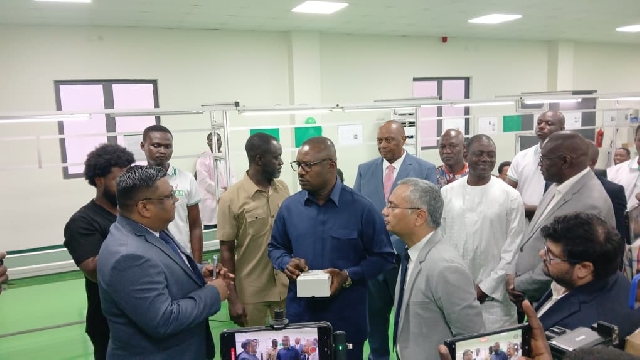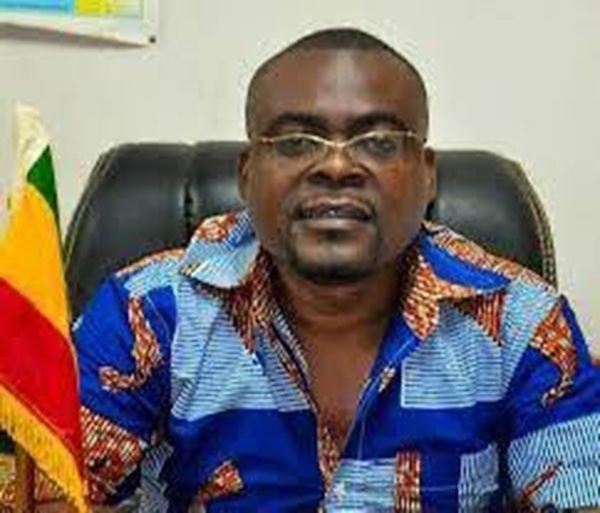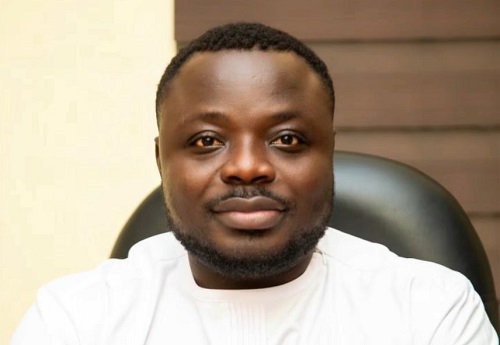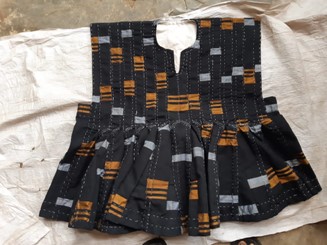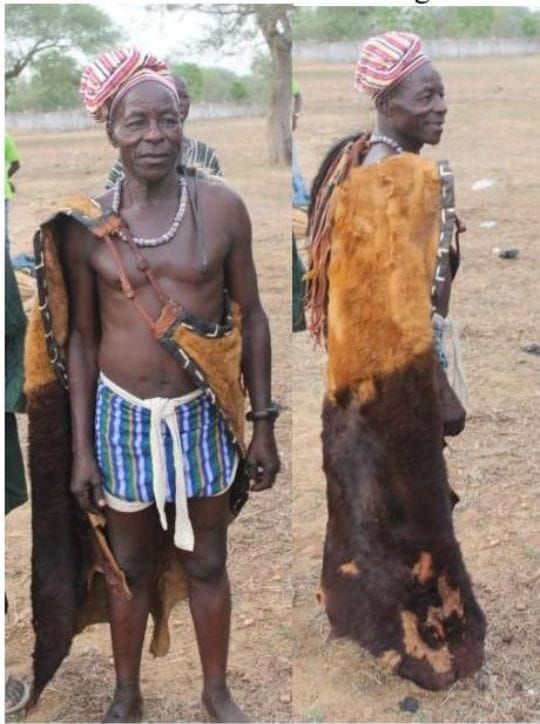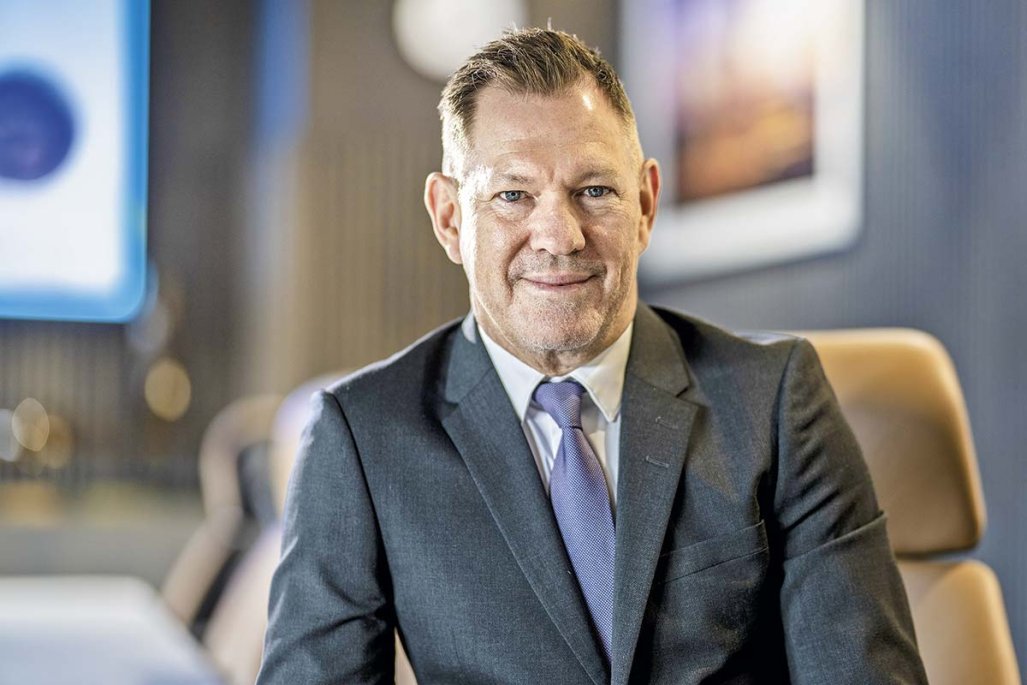Swallowed by Drugs: Minister Rallies Youth and Parents in Fight Against Substance Abuse
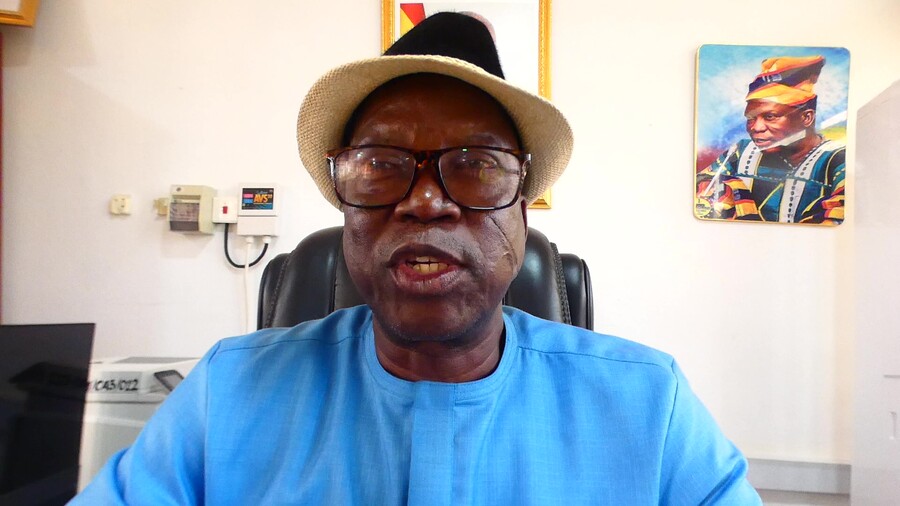
The Upper East Regional Minister, Mr. Akamugri Donatus Atanga, has expressed deep concern over the rising trend of drug and alcohol abuse among the youth in the region, cautioning that such practices only worsen personal struggles instead of resolving them. In a documentary titled “Swallowed by Drugs” with Apexnewsgh’s Ngamegbulam Chidozie Stephen, the Minister likened the reliance on drugs and alcohol as a way of coping with stress to “postponing problems.” “If you are seeing that you are stressed, and for that matter, you want to go under the influence of drugs or alcohol to free yourself, you are simply postponing that stress,” he warned. “Because when the influence of the drug is over, then you have worsened your situation.” Instead, Hon Atanga encouraged young people to channel their energy into productive activities. “I would want to advise that you should concentrate on your academic activities and other professions. If you are into crafts, focus on that. When you concentrate on that, it can take you out of your troubles far better than alcohol or drugs,” he said. The Minister further urged the youth to draw inspiration from those who have overcome hardship, rather than imitating negative examples. “Don’t allow the people who have lost their way to influence you. Rather, look for the successful people to join,” he advised. The Regional Minister did not spare parents from responsibility, stressing that family attitudes often shape the choices children make. He noted that dismissing or ignoring children’s concerns could push them toward substance abuse. “Sometimes, as parents, we push them into these things. If you knock at them whenever they raise concerns, they feel nobody minds them in society. Then they resign themselves to taking drugs so they can take comfort and adapt,” he explained. He urged parents to adopt open dialogue, counseling, and positive mentorship for their children. “When you see them taking drugs, sit them down, look for counselors, or help them associate with people of good character,” he advised. The Minister also pointed to the increasing availability of unregulated pharmacies and drinking spots as fueling the crisis. “Now you have pharmacies everywhere, some not properly regulated, where hard drugs can be accessed easily. You also have drinking spots all over, which makes alcohol too available,” he observed. He recommended stricter measures by local assemblies to regulate sales. “Assemblies should pass by-laws to supervise the sale of alcohol and the operation of pharmacies. Regular inspections must be done to ensure the drugs sold are wholesome,” he said, adding that such interventions would help reduce abuse. As “father of the region,” Hon. Atanga concluded with an appeal to the youth to resist the lure of substance abuse and invest in their future. “There is not only one person who faces difficulties. Others have faced even worse situations and overcome. If you put your time to proper use, you will sustain yourself and rise above depression and hardship,” he reminded. Source: Apexnewsgh.com
Leprosy: Upper East Region recorded 188 official cases between 2019 to September 2025
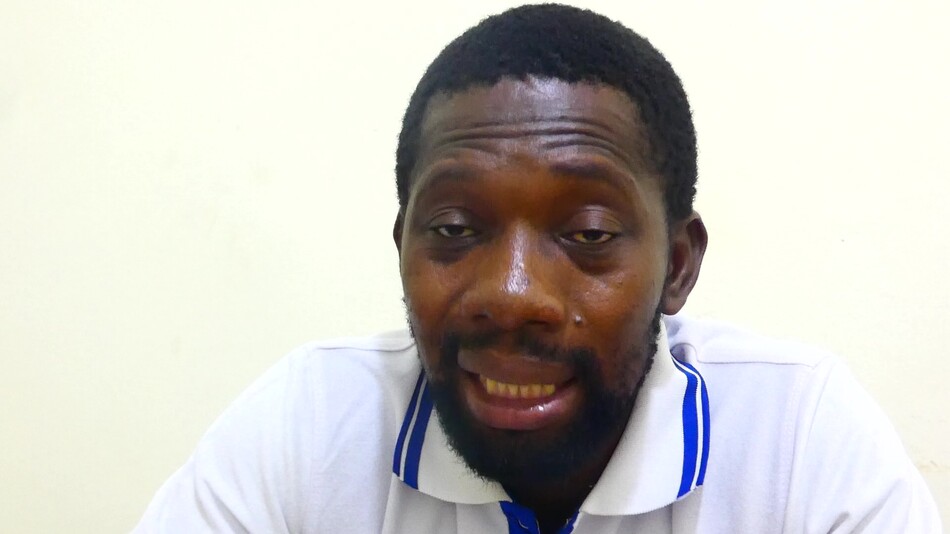
Between January 2019 and October 2025, the Upper East Region of Ghana quietly recorded 188 cases of leprosy, a disease as old as civilization, yet as misunderstood and feared as ever. Apexnewsgh reports These numbers, dry on paper, conceal stories of courage and struggle, of families fractured and communities forever changed. At the center of this unfolding story is Eric Dakura, the Disease Control Officer at the Upper East Health Directorate, whose daily work illuminates the dark corners where leprosy still hides. Eric’s insight and passion were brought to light in the documentary “Pains of the Forgotten: Leprosy, Stigma, and Resilience,” produced by Ngamegbulam Chidozie Stephen of ApexNewsGH. With a clinical calm that betrays deep empathy, Eric decoded the disease for viewers: “Leprosy is a disease of the skin and the nerves. If you don’t get the treatment early, it will affect your nerves and finally lead to the wasting of your feet or your fingers, and that can lead to disability.” Unlike most diseases, leprosy’s touch is silent. Its symptoms can take years—sometimes three, five, even twenty- to appear after infection. “It’s not like any other disease that when you get infected within a week or two weeks, you get the signs and symptoms,” Eric explains. “It can be in you for over three years, up to twenty or even more years until it begins to manifest.” The first warning is often a pale, painless patch on the skin. Because these patches neither itch nor hurt, they are easily dismissed—until the disease has already begun its devastating work. “Leprosy doesn’t cause pain,” Eric says. “That is why you can see somebody with their fingers being chopped off, but there is no pain… if you even put them into fire, they will never feel anything because the nerves are all destroyed.” The destruction of nerve endings is what makes leprosy so dangerous and so easy to miss. Eric recalls a haunting case from his rounds: “A girl found a three-inch nail in her foot last year. She didn’t even know it was there because all the nerves were affected.” By the time many are diagnosed, the disease has already stolen their ability to feel, to move, or even to recognize when they are hurt. Early detection remains the greatest challenge. “We always get to know leprosy at a later stage, when the hands and the feet are gone. We don’t want to be recording cases at that stage because it means that our surveillance system is not the best.” The region now grades leprosy cases by disability: some show no deformities, some suffer numbness, while others arrive with missing fingers, feet, or affected eyes. Leprosy is endemic in all districts, but certain areas—like Bongo—have become persistent hotspots. There is progress, though: the annual number of new cases has dropped, from 32 in 2020 to just 16 currently on treatment. Yet Eric cautions that declining numbers are not always comforting. “If we record a lot of cases, it’s also good—meaning we are fishing out the hidden cases and treating them. But if we feel the numbers are declining, that could also be dangerous. We must always be on the watch.” Leprosy respects no boundaries. It is not hereditary, nor confined to the poor or the old. “Seventy percent of cases are male, but the youngest can be just two years old,” Eric shares. “There is no age that is exempted. Everybody, males, females, we are all at risk of getting it.” Yet there is hope, because leprosy is curable. “Leprosy is curable. That has always been the slogan. Just come, we’ll treat you and you’ll be fine,” Eric says, his tone unwavering. The medication, though costly for the government, is provided free of charge. “Wherever you are, the medicine can come to you, even your home.” But for all the medical progress, the greatest struggle is not clinical, but social. The shadow of stigma still looms large. “If you are affected, and unfortunately you lose your legs, there’s no way the person will be able to make life meaningful for himself. Even my own children, they dissented me. People that I used to eat with, they can’t eat with me,” Eric recounts, echoing his patients’ pain. He urges empathy and shared responsibility: “The fact that it hasn’t manifested in you doesn’t mean you don’t have it. So we just have to believe each other as people. When somebody has a problem, that is also your problem.” Often labeled a “disease of the poor,” leprosy’s grip is strengthened by poverty and neglect. “Almost all the people who are largely affected are people who come from poor living conditions. Eighty to ninety percent of the cases are in Africa. Because Africa is highly impoverished,” Eric explains. Still, hope guides his work. Through outreach, education, and persistent surveillance, the region edges closer to a day when leprosy is history. “If we get to a point where in a population of about 10,000, only one person is likely to have it, that is the aim,” Eric says. “So, in years to come, a generation will come that will not suffer from this kind of disease.” Until then, the story of leprosy in Ghana’s Upper East is one of vigilance, hope, and the unyielding human spirit, a story that, thanks to people like Eric Dakura, is no longer shrouded in shadows but moving steadily toward the light. WATCH THE VIDEO DOCUMENTARY: Source: Apexnewsgh.com/ Ngamegbulam Chidozie Stephen
Pains of the Forgotten: Leprosy, Stigma, and Resilience in Ghana–VIDEO ATTACHED
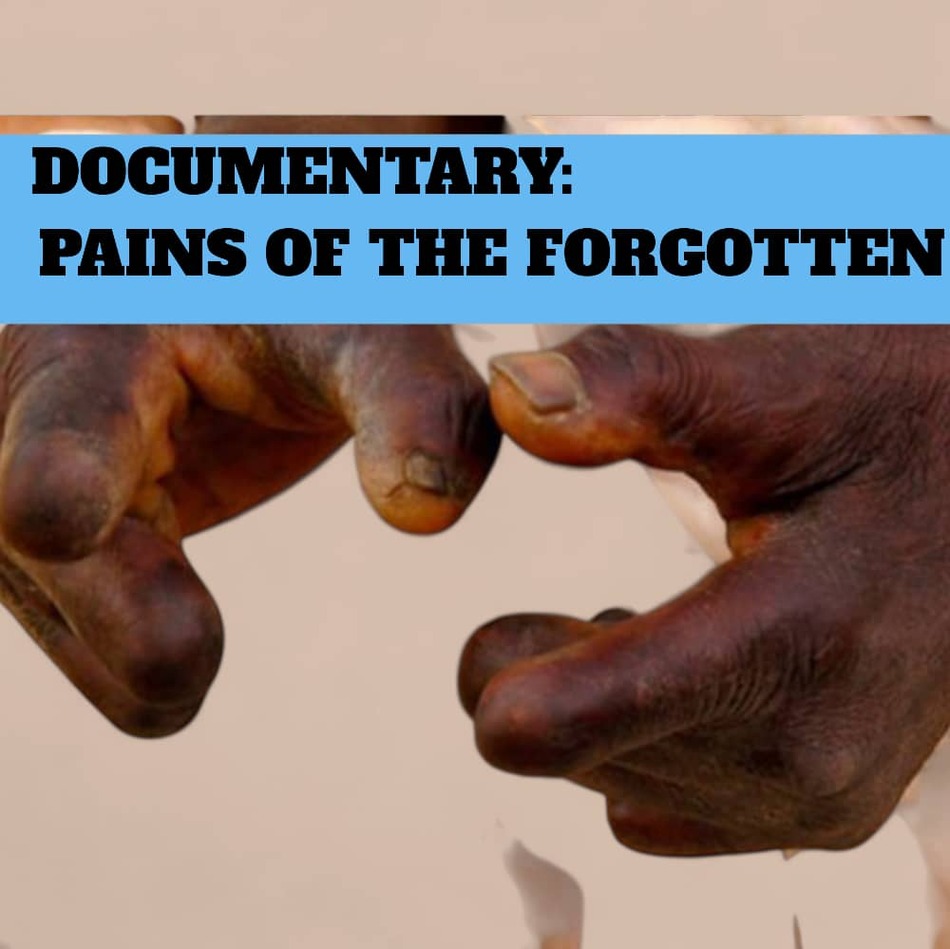
A documentary by Ngambebulam Chidozie-Stephen (ApexNewsGH) Editor in Chief Leprosy is one of humanity’s oldest diseases, yet in 2024, it remains a pressing global health crisis. According to the World Health Organization (WHO), 188 countries and territories reported a total of 172,717 new cases last year. The impact is not evenly distributed; women and girls comprised over 40% of new patients, and children accounted for more than 9,000 cases. Most troubling, over 9,100 new sufferers were diagnosed with the most severe form, grade 2 disability, a diagnosis that can mean permanent deformity and a lifetime of hardship. While leprosy’s global shadow is long, its most profound pain is felt in places like Ghana’s Upper East Region. Here, in the Bongo district, a community of just over 120,000 people, leprosy remains a silent threat. From 2019 to September 2025, 57 cases were officially reported, and the true number may be higher due to fear, stigma, and misunderstanding. Leprosy is just one of many Neglected Tropical Diseases (NTDs) that persist in Ghana. These diseases, fourteen of which are endemic in the country, disproportionately affect the poorest, deepening cycles of poverty and exclusion. Pain Behind Closed Doors: Matilda’s Story In the tight-knit community of Bongo Balungu, Matilda Nyaaba’s life is defined not only by the disease itself but by the isolation it breeds. For ten years, Matilda endured unexplained symptoms, fainting spells, nosebleeds, and growing weakness, a mystery to both her and the health professionals she visited. “Each episode left me weaker,” Matilda shares, remembering the confusion and fear that accompanied each new symptom. The only constant in her life became her monthly trips for medicine. Her family, she explains, has been a source of support, but the wider community’s reaction has been another story. She describes a self-imposed solitude, “I advised myself to stay indoors. They would use my condition against me.” Even basic errands, like fetching water from the borehole, are shadowed by the fear of being shunned. Whispers followed her: “Some described my illness as HIV, others as a curse. This has deeply affected my mental health; I don’t know what I’m thinking anymore.” Yet, Matilda’s resilience endures. She dreams of more than just survival: “If the government could help, maybe by providing vocational training, I could regain my dignity and hope for a brighter future.” From Provider to Dependent: Ania’s Struggle Before leprosy, Aniah Lamisi was at the center of her family’s livelihood in Bongo Soe. Farming was her pride and her purpose. But illness arrived quietly, a tingling in her fingers, followed by the slow, cruel twist of her hands. Aniah’s life shrank as the disease progressed. She could no longer wield a hoe or prepare meals over an open fire without pain. Even fetching water, a lifeline in the village, became a daily ordeal. She reflects on her new reality: “Some people have lost everything, even their mental faculties. I can still care for myself, dress well, and sometimes mingle with groups. That’s how I console myself. But if I can’t farm, how do I feed myself? I just sit and eat, if there’s food. Who will work for me?” Her appeal is simple but urgent. “If the government can provide us with a vocation or manual labor, we could earn a living. Now, I just wait and hope for food. Even cooking is painful, but who else will do it for me?” In Bongo Swing, Mr. Adombire Ayuumbeo once embodied industry and self-reliance. He farmed, cut firewood, and harvested thatch, supporting his family with pride. But when leprosy struck, it took his independence, disfigured his body, and left him idle. He describes the loss with raw honesty: “Everything I used to do to earn a living is gone. Now I am helpless. I sit alone. Nobody helps me. Sometimes I think it would be better to die than live like this. People stigmatize you. I don’t know why God gave me this disease that people don’t respect. When I remembered all these things happening to me, my tears began to fall.” He issues a plea not just for himself, but for others like him: “If the government can help sustain our lives, they should do it. I vote, I have a voting ID. If the government has anything to help, we would appreciate it.” The Sustainable Development Goals (SDGs), specifically Goal 3: Good Health and Well-being, address neglected tropical diseases (NTDs) like leprosy under Target 3.3. This target states: “By 2030, end the epidemics of AIDS, tuberculosis, malaria, and neglected tropical diseases, and combat hepatitis, waterborne diseases, and other communicable diseases.” This means that the global community, through the United Nations and its member states, has committed to eliminating NTDs, including leprosy, as public health problems by 2030. The aim is to reduce illness, disability, stigma, and death caused by these diseases through prevention, early detection, treatment, and improved access to health services, especially for vulnerable populations. In essence, the SDGs recognize that fighting NTDs is essential for achieving universal health coverage, reducing inequalities, and promoting the well-being of all people, particularly those living in poverty and marginalized communities. Ending NTDs like leprosy not only improves health outcomes but also supports broader development goals such as education, gender equality, and economic productivity. The rising trend of leprosy in Bongo is confirmed by Mr. Bismark Kpankpari Wononuo, the district’s Disease Control Officer, who doubles as the NTDs coordinator. He explained that the numbers increase every year. He credits increased detection to community volunteers but warns that the real challenge is stigma. According to him, “Many don’t come early for treatment due to discrimination. Early detection is key; if we treat early, within nine months, it can be cured. But when affected persons decide to report late, it causes deformities to remain for life.” He further sends a clear message to the community by letting them know that Leprosy is treatable and that early detection is crucial. “Everybody is at risk.” However, he acknowledged that there are
ApexnewsGh Editor Ngamegbulam Chidozie Stephen Earns Another Nomination at 4th Upper East GJA Awards

The Editor-in-Chief and founder of ApexnewsGh, Ngamegbulam Chidozie Stephen, has once again earned a nomination in the prestigious 4th Upper East Regional Ghana Journalists Association (GJA) Awards, reaffirming his place among the region’s most outstanding journalists. The announcement, made by the Regional Secretary of the Association, Anthony Adongo Apubeo, in a press release dated October 3, 2025, followed a rigorous vetting process chaired by Professor David Millar, alongside Dr. Samuel Adadi Akapule and Ms. Fatima Anafu-Astanga. This year’s nomination adds to Ngamegbulam’s long list of achievements, underscoring his consistency and excellence in journalism. Over the years, he has received multiple honors from both regional and national bodies for his impactful storytelling and commitment to professional integrity. In 2019, he was awarded Regional Best Human Rights Reporter, and in 2022, he won the Regional Best Climate Change Reporter award. The following year, 2023, he reclaimed the Best Human Rights Reporter title at the Upper East GJA Awards. His influence extended nationally in 2024, when he was named Best Reporter (Online/Wire Service Category) at the 2nd Inclusive & Anti-Conflict Journalism Awards, a recognition that cemented his reputation as one of Ghana’s finest digital journalists. This year’s GJA Awards, according to the statement, received 42 entries from 18 journalists, with 13 finalists emerging across 14 competitive categories, including the coveted Journalist of the Year. The event, set for October 10, 2025, will take place at the serene Blue Sky Hotel in Zuarungu. It promises to be a grand celebration of journalistic excellence and dedication across the Upper East Region. For the illustrious Ngamegbulam, this nomination is more than just another honor; it is a reflection of years of tireless work, ethical reporting, and a deep passion for amplifying voices that matter. However, this year’s Awards will be held under the theme: “Upholding Public Trust: The Role of the Media in Promoting Accountable Governance in the Upper East Region.” Source: Apexnewsgh.com
Weak Controls and Hidden Owners: How Illegal Fishing Slips Into EU Markets
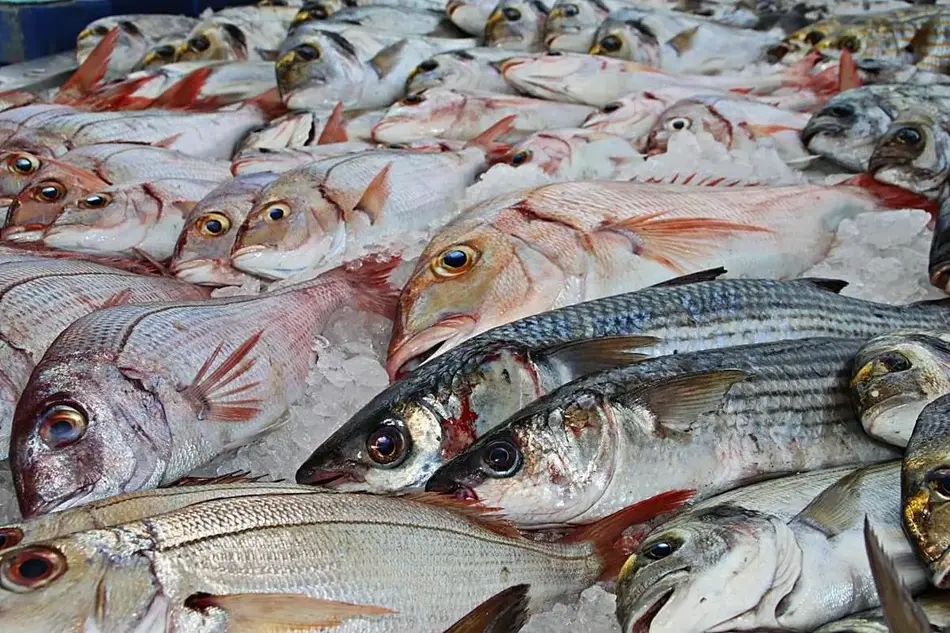
A lack of transparency, weak import controls, and complex ownership structures are enabling illegal fishing to flourish in Europe’s seafood supply chain, a new study commissioned by Oceana has revealed. The research shows that the EU’s long-distance fishing fleet is more than twice as large as officially documented when foreign-flagged vessels owned by EU companies are included. This raises red flags about how much illegal or unreported seafood may be slipping into European markets. Investigators describe landing sites as hotspots for illegal activity. In Palermo, Italy, one journalist discovered that intermediaries and “fishlanders” act as powerful brokers, mixing legally caught fish with illegal catches. “It’s like a fish laundry, what is legal and what is illegal can be mixed until it’s impossible to tell the difference.” Catch certificates, which are still largely paper-based, are another weak link. Forged documents allow illegally caught fish to be exported into the EU with ease. While industrial vessels are supposed to be tracked by satellite systems like AIS, many disappear from monitoring platforms such as MarineTraffic or Global Fishing Watch. Investigators say some fleets deliberately disable or avoid tracking to hide illicit activities. “When vessels vanish from the map, it’s not always a technical error, sometimes it’s a deliberate act to conceal illegal fishing.” Small but powerful artisanal vessels, especially in Tunisia, further complicate surveillance. Despite their size, they carry industrial-scale engines and hauls, but remain invisible to tracking systems. Tracing vessel ownership is another challenge. Many operators use shell companies and front businesses in tax havens to disguise the real beneficiaries. A case in Malta revealed a “company” that turned out to be nothing more than a post box, hiding Russian owners behind a network of intermediaries. “Illegal fishers know how to exploit weak governance; they change flags, change names, and hide behind paper companies.” A recent global study of 19,000 large-scale vessels found that 62% had no ownership information available in top maritime databases. Spain, France, China, and Taiwan — some of the largest fleets — had particularly poor transparency records. Within Europe, the study revealed that more than 344 EU-owned vessels are flagged outside the bloc, in countries ranging from Argentina to Panama. This means the EU’s actual long-distance fleet is nearly double its official size. Alarmingly, one in four of these vessels are registered under flags of convenience, tax havens, or countries already warned by the EU for weak fisheries controls. Spain, the Netherlands, and Italy top the list of countries owning foreign-flagged vessels, with Spain alone effectively operating 427 vessels, twice its official count. These loopholes undermine both EU and global efforts to combat illegal fishing. Not only do they allow illegal fish to enter European markets, but they also strip coastal states of fair revenues and erode trust in fisheries management. “Without transparency, EU consumers risk eating fish caught illegally, while profits flow to hidden owners abroad.” Experts argue that EU member states must start requiring companies and citizens to register ownership of foreign-flagged vessels and make this data public. Stronger digital systems for catch certificates, tighter port inspections, and international cooperation are also urgently needed. “If we don’t know who owns the vessels, where the fish really comes from, or how it gets to our plates, illegal fishing will continue to thrive in the shadows.” Source: Apexnewsgh.com Email: apexnewsgh@gmail.com
Ghana Boosts Recycling Efforts with Expanded Assistance for SMEs
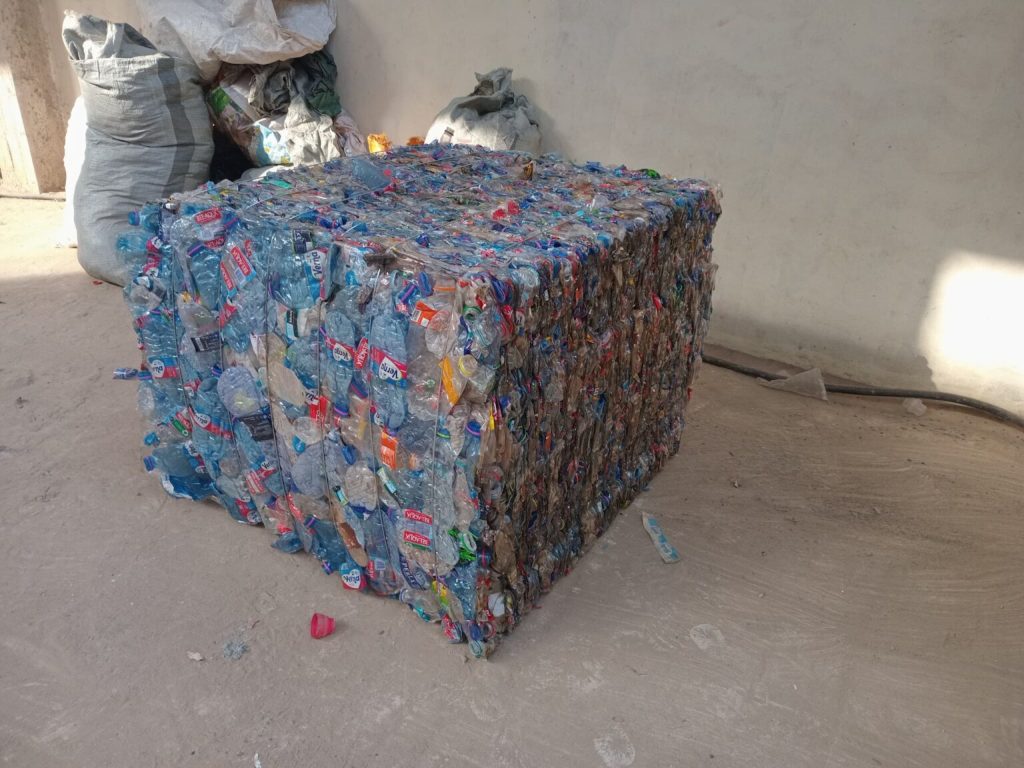
Minister for Environment, Science and Technology, Dr. Ibrahim Murtala Muhammed, has announced plans to expand assistance and grants for Small and Medium Enterprises (SMEs) in recycling. Apexnewsgh reports This move aims to support entities with expertise in managing plastics and create jobs, particularly for women. During a visit to several SMEs under the ‘Establishing a Circular Economy Framework for the Plastic Sector in Ghana’ (CEF-PS) project, Dr. Muhammed emphasized the need for effective plastic waste management. He noted that about 60% of Ghana’s plastic waste comes from Greater Accra, but only 10% is processed, leaving a significant 90% unaccounted for. To address this challenge, the Minister plans to provide financial support to SMEs engaged in recycling, while also ensuring that the funds are utilized efficiently. “We will not only approve the money for them, but I would also ensure that we supervise and monitor their operations,” he stated. Dr. Muhammed highlighted the importance of job creation, especially for women, who make up the majority of Ghana’s population. “We need to have some affirmative policy decisions to correct some of the injustices,” he noted, emphasizing that while men will also be considered, women will be the priority. The SMEs visited by the Minister include Nel Plastics, Universal Plastic Products and Recycling Company, and Integrated Recycling and Compost Plants Ltd., among others. This initiative is a significant step towards promoting a circular economy and reducing plastic waste in Ghana. Source: Apexnewsgh.com
Gabriel Agambila to Meet Foreign Affairs Minister Over Delayed Upper East Passport Office
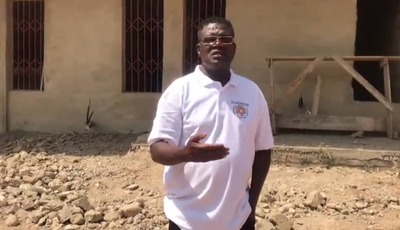
In his recent visit to the ongoing construction site of the new passport office in the Upper East region, Mr. Gabriel Agambila, a prominent opinion leader in the Diaspora, has voiced out his concerns about the potential delays in the project’s completion. Apexewsgh reports Currently, the office stands at only 48% completion, leaving many residents anxious about their ability to access vital passport services. Mr. Agambila’s visit was driven by a sense of urgency as he witnessed the struggles faced by local citizens. He noted that obtaining or renewing passports often requires residents to embark on long journeys to cities like Tamale, Wa, or even Accra. These treks not only consume valuable time but also pose significant risks to their safety. Realizing the impact of these challenges, Mr. Agambila is calling on the Minister of Foreign Affairs, Honorable Samuel Okudzeto Ablakwa, to intervene promptly. He believes that a temporary solution is imperative to ease the burden on the residents. As part of his proposed solution, Mr. Agambila has identified a vacant office within the premises of Commercial Bank in the Upper East region, suggesting it could serve as a temporary passport office. This move would provide a much-needed stopgap measure, granting local residents access to crucial passport services while awaiting the completion of the new office. Emphasizing the need for a more convenient and accessible solution, Mr. Agambila is determined to discuss the matter further with Minister Ablakwa. His proactive approach underscores the importance of community advocacy in addressing pressing administrative challenges, particularly in regions that are often overlooked. The residents of the Upper East region wait hopefully for a swift resolution to their passport woes. Source: Apexnewsgh.com
Embracing Grass Biochar: A Game-Changer for Farmers in Talensi

Peter Abunga, Department of Social Welfare and Community Development Talensi, has expressed his enthusiasm for grass biochar, a innovation that has the potential to revolutionize farming in the region. Apexnewsgh reports Speaking at a dialogue meeting organized by the Millar Institute for Transdisciplinary and Development Studies (MITDS) in Bolgatanga, Mr. Abunga shared his views on the benefits of grass biochar, highlighting its potential to improve soil fertility, reduce the need for chemical fertilizers, and increase water retention in the soil. Mr. Abunga, who comes from a farming background, emphasized the significance of this innovation for farmers in the region. He noted that the use of chemical fertilizers has become increasingly expensive, making it difficult for farmers to afford. Grass biochar, on the other hand, is a cost-effective and sustainable solution that can help enrich soil fertility, reduce soil erosion, and increase crop yields. The Department and Community Development Talensi official expressed his gratitude to the Millar Institute for introducing this innovation and urged the government to intervene and support the implementation of grass biochar in farming practices. He emphasized that government backing is crucial for the success of this policy, particularly in the context of the Planting for Food and Jobs initiative. Mr. Abunga’s endorsement of grass biochar is a testament to its potential to transform farming in Talensi and beyond. As a community leader, his support is essential in promoting this innovation among farmers and encouraging its adoption. “With government support, grass biochar can become a game-changer for farmers in the region, improving their livelihoods and contributing to food security”. He stressed Source: Apexnewsgh.com Thanks for reading from Apexnewsgh as a news publishing website from Ghana. We encourage you to freely share this story via social media platform and follow us on; Facebook on APEXNEWSGH-Tv or Please contact Apexnewsgh.com on email apexnewsgh@gmail.com for your credible news publications. Contact: 0248250270/0256336062
Grass Biochar: A Natural and Cost-Effective Solution for Soil Fertility–Ali Rapheal Yenbapono

Ali Rapheal Yenbapono, Project Manager of Tuna Women Development Project (TUWODEP), has expressed his enthusiasm for the grass biochar innovation introduced by the Millar Institute for Transdisciplinary and Development Studies. Apexnewsgh reports At a zonal dialogue meeting in Bolgatanga, Mr. Yenbapono shared his views on the potential of this technology to improve soil health, increase productivity, and reduce poverty. Mr. Yenbapono highlighted the abundance of grass in the region, which can be easily accessed and utilized for biochar production. He emphasized the benefits of this innovation, particularly for rural farmers, who can use biochar as a cost-effective alternative to expensive fertilizers. This, in turn, can help reduce soil degradation and improve crop yields. “Prof. Millar has done well identifying this grass biochar innovation. Because, we have a lot of grass in abundance and is something that we don’t even go to buy. And I think, this innovation, if we advocate it well, it will go a long way to help our people especially people in rural areas. Cutting of tree are now becoming too much for us. So, grass is a free thing we have to embrace”. He said Regarding government intervention, Mr. Yenbapono stressed the importance of policy support to promote this innovation. He suggested that government policies, such as incorporating biochar into school curricula or promoting its use through traditional authorities, can go a long way in enhancing its adoption. Mr. Yenbapono also acknowledged the rampant issue of bush fires in the Savannah region and expressed his belief that this innovation can help minimize the occurrence of such fires. By promoting the use of biochar, communities can reduce the amount of dry grass that fuels bush fires. Source: Apexnewsgh.com Thanks for reading from Apexnewsgh as a news publishing website from Ghana. We encourage you to freely share this story via social media platform and follow us on; Facebook on APEXNEWSGH-Tv or Please contact Apexnewsgh.com on email apexnewsgh@gmail.com for your credible news publications. Contact: 0248250270/0256336062
Commercializing grass biochar is something we are going to go— Madam Miyella Lydia
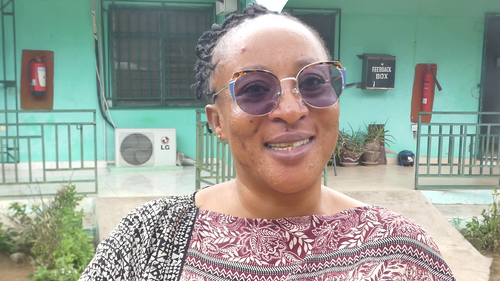
Executive Director of Maaltaaba Pesaent Women Farmer Cooperative, Miyella Lydia, has expressed her enthusiasm for the grass biochar innovation, pointing its potential to improve the environment and empower vulnerable widows. Apexnewsgh reports During a zonal dialogue meeting in Bolgatanga, Madam Miyella shared her organization’s experience with grass biochar and their plans to commercialize its production. “Our main focus is on the environment, and when this technology was introduced, I was thrilled,” she said. “Through the Forest and Farm Facility (FFF) project, we have acquired a lot, and Chief has given us land where we have demonstrated the grass biochar. The women I work with cannot afford certain inputs for their farms, so when this technology was introduced, we embraced it.” Madam Miyella explained that her organization has demonstrated grass biochar in their farms, backyard gardens, and Portray farms, encouraging their women to use it. “We know that when there’s enough biochar on the soil, it helps with water retention, which is crucial in the Upper East region where we have drought issues,” she added. She highlighted the benefits of grass biochar, including its ability to take away the scent in Portray farms and its use as fertilizer. “We are planning to commercialize it next year, and we pray that if you want to buy, you can visit Maba, and they will start measuring it in both for people to buy,” she said. Madam Miyella further emphasized that her organization has received the technology wholeheartedly and is committed to promoting it. “It is a very good technology, and we are going to do it because it is something that will help our women,” she concluded. Source: Apexnewsgh.com Thanks for reading from Apexnewsgh as a news publishing website from Ghana. We encourage you to freely share this story via social media platform and follow us on; Facebook on APEXNEWSGH-Tv or Please contact Apexnewsgh.com on email apexnewsgh@gmail.com for your credible news publications. Contact: 0248250270/0256336062

